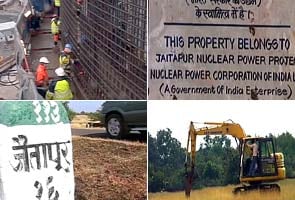
New Delhi:
The government today made it clear that it will not reconsider its decision to set up the world's largest nuclear power plant at Jaitapur in Maharashtra's Ratnagiri district.
Villagers in the area and different groups of activists have opposed the plant - and in response to their criticism, the government said that it is focused on security and transparency.
When completed, the plant will have six reactors, of which the first two will be operational by 2019. The government says it will have a stand-alone safety system for each reactor.
Environment Minister Jairam Ramesh, Maharashtra Chief Minister Prithviraj Chavan and Minister of State in the Prime Minister's Office Narayanasamy all met with Dr Manmohan Singh this afternoon to discuss the controversial project.
At a press conference later, they said a bill will be introduced to create an autonomous nuclear regulatory body which will eventually replace the current Atomic Energy Regulatory Board. All reviews by this Board will be made public and for now, a new safety audit will be conducted by the International Atomic Energy Agency (IAEA).
Maintaining that the livelihood of local fishermen and their families will be a priority for the government, Mr Narayanswamy said a new compensation package is being developed for them.
Those who are opposed to the plant worry that Jaitapur is an earthquake-prone zone.
In what the government insists is an unrelated development, it has announced it the government says it spend 300 cores drilling an 8-kilometre-deep bore hole just 64 kilometres from Jaitapur at a place named Koyna. The hole will be laced with sensors to monitor the evolution of seismic events. The government clarified this study is not linked to the Jaitapur nuclear project.
Villagers in the area and different groups of activists have opposed the plant - and in response to their criticism, the government said that it is focused on security and transparency.
When completed, the plant will have six reactors, of which the first two will be operational by 2019. The government says it will have a stand-alone safety system for each reactor.
Environment Minister Jairam Ramesh, Maharashtra Chief Minister Prithviraj Chavan and Minister of State in the Prime Minister's Office Narayanasamy all met with Dr Manmohan Singh this afternoon to discuss the controversial project.
At a press conference later, they said a bill will be introduced to create an autonomous nuclear regulatory body which will eventually replace the current Atomic Energy Regulatory Board. All reviews by this Board will be made public and for now, a new safety audit will be conducted by the International Atomic Energy Agency (IAEA).
Maintaining that the livelihood of local fishermen and their families will be a priority for the government, Mr Narayanswamy said a new compensation package is being developed for them.
Those who are opposed to the plant worry that Jaitapur is an earthquake-prone zone.
In what the government insists is an unrelated development, it has announced it the government says it spend 300 cores drilling an 8-kilometre-deep bore hole just 64 kilometres from Jaitapur at a place named Koyna. The hole will be laced with sensors to monitor the evolution of seismic events. The government clarified this study is not linked to the Jaitapur nuclear project.
Track Latest News Live on NDTV.com and get news updates from India and around the world

